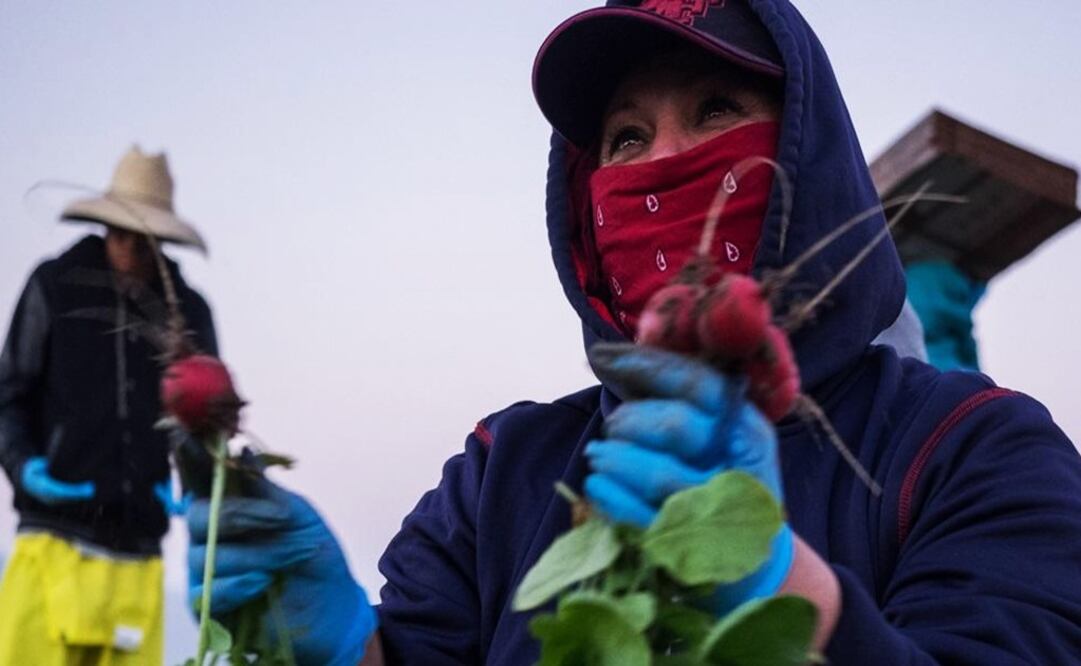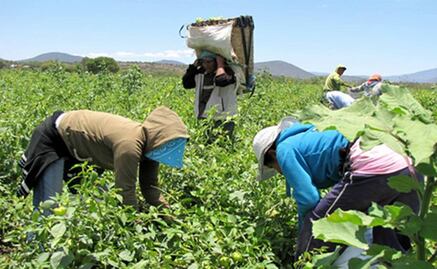Más Información
"Estás viendo tormenta, hijito, y no te hincas"; Ricardo Monreal le pide a su hermano Saúl desistir de la gubernatura de Zacatecas

"La instrucción es que no salga de la cárcel": Javier Duarte; acusa "tintes políticos" en su nuevo proceso penal

Captan en video a regidora de Ocotlán cargando y manoteando a mono araña; Profepa presenta denuncia penal por posesión ilegal
The day Ramona Bon arrived at the agricultural fields in Bakersfield in the U.S. , there was no room for anybody: every vine, every tree trunk was occupied by pairs of busy hands.
The race for a spot was fierce. Hundreds of immigrants were clustered in the green furrows for a low wage, but there was no money left and they couldn't travel thousands of miles and go back home.
That morning, Ramona , a 37-year-old Mexican , with a strong body, closed her eyes and took a deep breath.
She had migrated without documents, and her options had been reduced to one: work in the fields, accompanied by her children. She didn't know anything about harvesting, but what worried her the most were the four children she brought from Mexico. That day, in 2008, she and her children were tested in a vineyard. The woman was afraid the children would fail, but the little hands were fast in picking the purple fruit.
She wasn't fast enough. Knowing the delicacy and quickness required to reap ripe grapes would determine her permanence in the U.S. made her tremble and her hands became clumsy.
Her children were hired. Ramona would have to go back two weeks later after practicing, but the children won her a spot inside the metal sheds the ranch offered the farmers.
She was overwhelmed. She traveled across a foreign country with her children, arrived into the agricultural fields, and got a job without papers, but was she convinced this was her destiny? She remembered her husband, the car accident where he died, and the financial needs she went through since that day. She remembered the MXN $500 each of her children received as the payment for her husband's life insurance policy; the MXN $3,000 widower pension she received, which wasn't enough. She remembered that after her husband, there was nothing left.
Then it began: she put on a florescent scarf over her mouth, she straightened her shirt, and put on a jacket to hide her body. A lemon. A watermelon. Once, and again.
“I have no hopes. I'm never going back to Mexico ”.
The salary runs out as soon as it arrives
It's 4:30 am and each of Ramona 's step is part of a routine: the alarm rings. She showers quickly, almost in the dark. She does her hair into a ponytail. She puts on her pants.
She uses a roller to warm up her hands, which will later pick up seasonal fruit. She makes tortillas for all the family; corn dough fills you up and it's cheap. It's been eight years since the day she and her children arrived in the U.S. , and Ramona is still reaping. She learned that discipline is profitable. She wakes up, reaps, cleans, and sleeps. Then wakes up again.
She arrived in the U.S. with her 3 sons, between 10 and 14 years old, and a daughter. Her sons grew up and went back to Mexico . Her daughter also works as a harvester and as Ramona herself, she's a single mother. Every check vanishes when you have to support two children, and also send money to three sons in Mexico .
A female farm worker earns between USD $1,500 and USD $2,000 per month. They leave just as they arrived: someone without paper will hardly be able to buy a house, and if they did get access to a mortgage, the interest rate would be high. Ramona pays USD $750 in rent, USD $500 in utility services, and USD $300 in food.
Every day, she works eight and up to ten hours under the sun. Her salary is established by the contractor. She earns USD $480 a week, which isn't enough. She pays a babysitter, another undocumented woman, who takes care of her grandchildren, and pays her USD $480 per month. It's calculated that there are around 700,000 domestic workers and nannies in private homes in the U.S. , who are mostly migrants, undocumented or not.
Ramona
and her daughter work at Coachella , a small agricultural community in the midst of a palm trees oasis, two hours away from Los Angeles . It's an enormous 262,467 square foot barn that produces many of the strawberries, dates, and grapes consumed in the U.S . Fruits cultivated and harvested by Mexican hands.
Although Coachella is known worldwide because of its music festival , the ethnic composition of its attendees, which is mostly Caucasian , is very different from the city's inhabitants, 43,000, where three out of four residents are Latinos .
It was in Coachella where César Chávez opened the first farm workers' union office, United Farm Workers of America , and started a historic boycott against grape producers in 1965, a landmark in the history of the farmers' movement and the defense of civil rights in the U.S.
“Less than a month ago I fell from the top of a lemon three. I hurt my eye and it was full of blood. But I got up and kept on working because we have to eat”, says Ramona .
Ramona was born 45 years ago in Estación Naranjo, a small town in Sinaloa . She's one of the 1.75 million farm workers , women and men, who work in the U.S. as illegal immigrants , according to the National Agricultural Workers Survey ( NAWS ).
Ramona
is a farm worker , like the other 630,000 female farm workers that, just like her, are exposed to violence, sexual harassment, and worker exploitation . Their challenge is to take care of their children and work.
At 6:00 am, Ramona will work for 10 hours, and will only take to 15-minute breaks to go to the bathroom. She will have to bend half her body until she reaches the furrow because they have to harvest radish today, you have to rip it from the earth.
The rach's manager, a dark-skinned man with a Mexican accent, invites the workers to warm up. They have to flex their knees, move their arms, jump, an exercise routine to wake up and diminish the cold. The wind blows, no one talks. A laughter is heard here and there. It's very early and the cold petrifies the movements, even the lips.
No right to rest
Ramona
is cast down. She only got three and a half hours of sleep because the previous day she cooked, cleaned, did laundry, and went grocery shopping.
“Sometimes I can't get out of the car. I park and say to myself: “I have to go in, no one is going to do it for me”, she says.
Ramona has been at work for two hours when the sun comes out.
Maricruz Ramírez,
who leads the Organización Líderes Campesinas de California (Leader Female Farm Workers from California's Organization), warns that women like Ramona accept everything they suffer: they endure all kinds of injustices to avoid being deported . They never rest.
Sometimes, only sometimes, Ramona feels as if the earth was sucking the life from her. Like a time when a cold caused her joint pain and she couldn't move her arms, or when her knees were swollen after being bent on the earth for so long.
“Last year I was sick for a week, after working on wet earth for so long. It was the first time I missed work for five days. They didn't fire me, but they didn't pay me either. We have no rights”.
It's Thursday and the working week is almost over. Ramona feels pain in her arms, her legs are heavy. Her back, which is always hunched, has turned against her: she feels as if she had a stake nailed through her back.
“I'm alone, I have twice the courage, I have to encourage myself because who will encourage me? No one, I have to have the courage myself and think positively. The next day will probably be worse, and you have to pay the bills, you don't have the right to stay in bed”.
In regards to salary, it's also against her: a 2010 report from the Southern Poverty Law Center, calculates that the average annual income of female farm workers is around USD 11.25 per hour, compared to USD $16.25 men earn. For that salary, women endure everything.
“Something I remember, it was a long time ago, when I went to the bathroom once. As I was leaving the bathroom a man came up to me and said: 'Your tits are so big'. I didn't say anything because I felt so ashamed. I didn't know what to do, I was so embarrassed.”
They would do anything for their children
Blas Gutiérrez
is a lawyer, he's the director of California Rural Center Assistance , a civil organization that legally represents farm workers in the U.S . Along with Lorena Martínez , a social worker, they established in Coachella .
They say Ramona 's story is repeated all the time: low wages , strenuous workdays under the sun, sexual harassment carried out by workmates, supervisors, and butlers: they begin with cat-calls and end in unreported rapes .
“They have children who they are fighting for, they have to feed their families, provide a home, so they basically endure any kind of harassment, mistreatment, and threats”, says Martínez . They can't do anything, their children stop them, that's why they endure all the discrimination.
“But no check, nothing, compares to the love of a child. Not one, or two, or three checks”, Ramona cries for the first time since the conversation began.
Ramona
hasn't seen her three children in five years: one was deported, the other two left the country and could never return. What hurts her the most about being so far away is that one of them is in prison, in Mexico , and sometimes, just sometimes, she wants to return. But she remembers that car accident where her husband died and remembers that her salary pays for son's expenses in jail.
The phone calls are quick: it's long-distance, it's very expensive, and they don't last long. That small plastic box, those cables, are her sons. The representation of the missing men, transformed into voices.
It's been ten hours since Romona arrived in the field. Hundreds of cardboard boxes are carefully piled up inside of a truck. There's no room for imperfection, they can't be damaged: they're high-quality red radishes, 100% organic, that are distributed in specialized markets.
The perfection of the radishes contrasts with the hands that were buried inside the earth to harvest them . Ramona 's hands are dry, her fingers are cracked, and her nails are dirty. All those furrows cracked by the sun will harvest tomorrow. Again, and again.
This story is a collaboration between EL UNIVERSAL and UN Women .
Noticias según tus intereses
[Publicidad]
[Publicidad]












